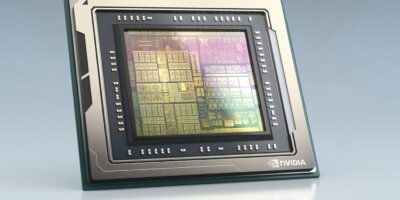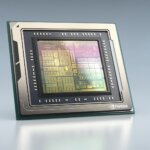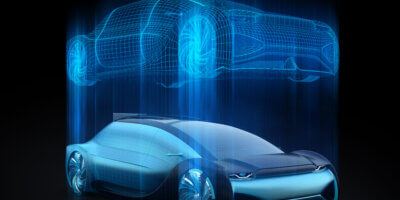
People arrive for the Consumer Electronics Show (CES). (Photo by Frederic J. BROWN/AFP).
CES 2024: Intel and Qualcomm to take on Nvidia in automotive industry
- Intel and Qualcomm made big announcements for the automotive industry at CES 2024.
- Qualcomm announced breakthrough innovations across its Snapdragon Digital Chassis portfolio.
- Intel unveiled a new family of AI-enhanced software-defined vehicle system-on-chips.
At the Consumer Electronics Show (CES) 2024, announcements in the automotive industry are always most highly anticipated. Apart from tech companies unveiling their latest innovations in various products and services, carmakers also showcase new models and features. But the automotive industry is just one part of CES 2024.
As expected, AI was center stage at this year’s CES, with most of the new products built on the technology’s use cases. That includes self-driving baby carriages, chatbots in cars as well as AI in beauty products. Among the big names participating were European and Chinese carmakers, mobile phone companies, and chip companies.
Nvidia, which dominated most of the announcements at CES 2024, unveiled several new products for gaming laptops as well as new partnerships with EV carmakers in China. But apart from Nvidia, two other chip companies are hoping to not only make an impact at CES 2024 but also challenge Nvidia across the year with their products.
Intel and Qualcomm Technologies have long dominated the mobile and laptop market. The chips produced by these two companies continue to enable innovation in these devices as well. And with AI adoption increasing, both Intel and Qualcomm are hoping to play an important role in developing the technology with a big focus on the automotive industry.
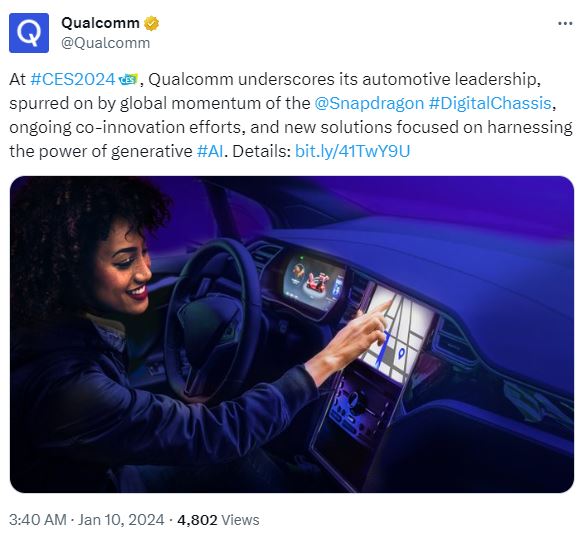
Qualcomm Technologies announced breakthrough innovations across its Snapdragon Digital Chassis portfolio.
Qualcomm continues to innovate in the automotive industry
At CES 2024, Qualcomm Technologies announced breakthrough innovations across its Snapdragon Digital Chassis portfolio. The company is in its twentieth year of supplying technology for the automotive industry, with revenue growing by double digits year-over-year, which has been driven by the increased adoption of Snapdragon Digital Chassis solutions.
“Our commitment to advancing automotive technology in support of global automakers, Tier-1 suppliers and our ecosystem partners is helping shape the future of software-defined vehicles and is accelerating us into a new era for the automotive industry,” said Nakul Duggal, SVP and general manager, automotive & cloud computing, Qualcomm Technologies, Inc.
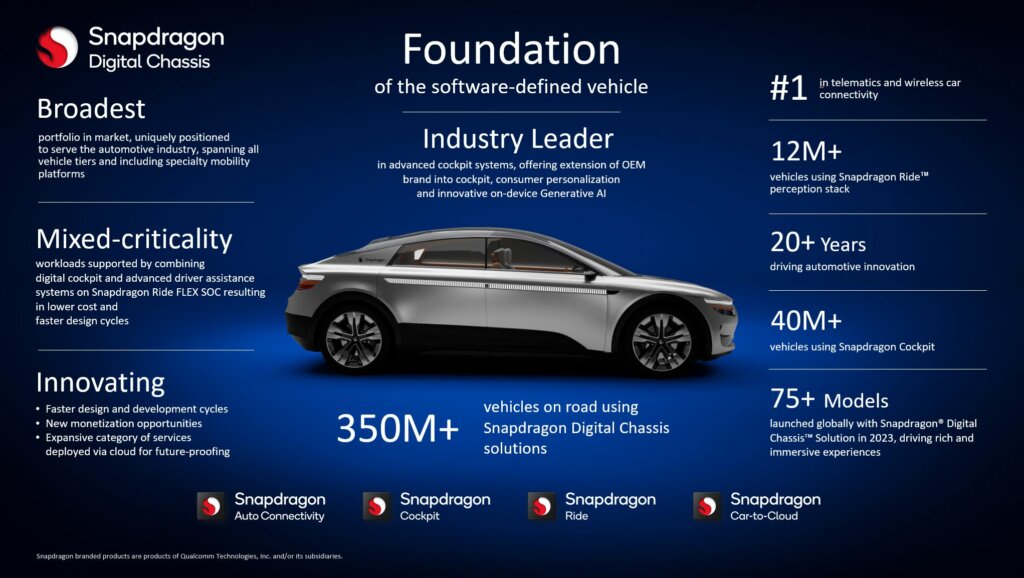
Some of the offerings by Qualcomm for the automotive industry. (Image – Qualcomm).
Some of the innovations announced include:
- Snapdragon Auto Connectivity Platform – the roadmap developed through Qualcomm’s decades of connectivity leadership. Automakers are being equipped to meet the increasing needs for higher levels of safety and intelligence powered by LTE, 5G, connected services, vehicle-to-everything (V2X), wi-fi, bluetooth, satellite communications and precise positioning.
- Snapdragon Cockpit Platform – the platform helps automakers create immersive, intuitive, and sophisticated in-vehicle experiences with its enhanced graphics, multimedia and AI capabilities.
- Snapdragon Chassis Platform – Qualcomm welcomes the era of AI for automotive and is using its industry-leading AI hardware and software solutions for the Snapdragon Digital Chassis Platform to help drive automotive AI forward. The Snapdragon Digital Cockpit Platforms are currently available with generative AI capabilities.
- Snapdragon Ride Platform – one of the automotive industry’s most advanced, scalable and customizable automated driving system-on-chip (SoC) family that is designed to help global automakers and Tier-1 suppliers build efficient automated driving (AD) solutions.
- Snapdragon Ride Flex – high-performance central compute SoCs that are designed to support mixed-criticality workloads across heterogenous compute resources, allowing for digital cockpit, advanced driver-assistance system (ADAS) and AD functions to co-exist on a single SoC.
- Snapdragon Car to Cloud – allows new features and services to be added throughout the vehicle’s lifecycle for highly personalized experiences across all tiers – letting automakers and fleet providers stay directly connected to consumers beyond the point of sale.
Qualcomm is also offering the Snapdragon Digital Chassis SoCs for two-wheelers and new vehicle class segments. The Digital Chassis SoCs are designed to enhance safety and experiences for the end user, offering fully integrated solutions that bring connectivity, infotainment, advanced rider assistance systems (ARAS) and personalized, cloud-connected digital services to motorcycles, ICE and electric scooters, 3-wheelers, e-bikes, ATVs, and vehicles for farming and agriculture.

Qualcomm is also offering the Snapdragon Digital Chassis SoCs for two-wheelers and new vehicle class segments. (Image – Qualcomm).
Watch out Nvidia, Intel has big plans to take on the industry
Intel also has big plans for the automotive market. At CES 2024, Intel announced that it plans to acquire Silicon Mobility, a fabless silicon and software company that specializes in SoCs for intelligent EV energy management. Silicon Mobility’s SoCs feature industry-leading accelerators purpose-built for energy delivery and co-designed with highly advanced software algorithms for significant gains in vehicle energy efficiency.
Last year, Intel sold off a small stake in Mobileye, a self-driving technology company. Should the Silicon Mobility acquisition go through, it will extend Intel’s reach in the vehicle beyond high-performance compute into intelligent and programmable power devices.
“Intel is taking a ‘whole vehicle’ approach to solving the industry’s biggest challenges. Driving innovative AI solutions across the vehicle platform will help the industry navigate the transformation to EVs. The acquisition of Silicon Mobility aligns with our sustainability goals while addressing a critical energy management need for the industry,” said Jack Weast, vice president and general manager of Intel Automotive.
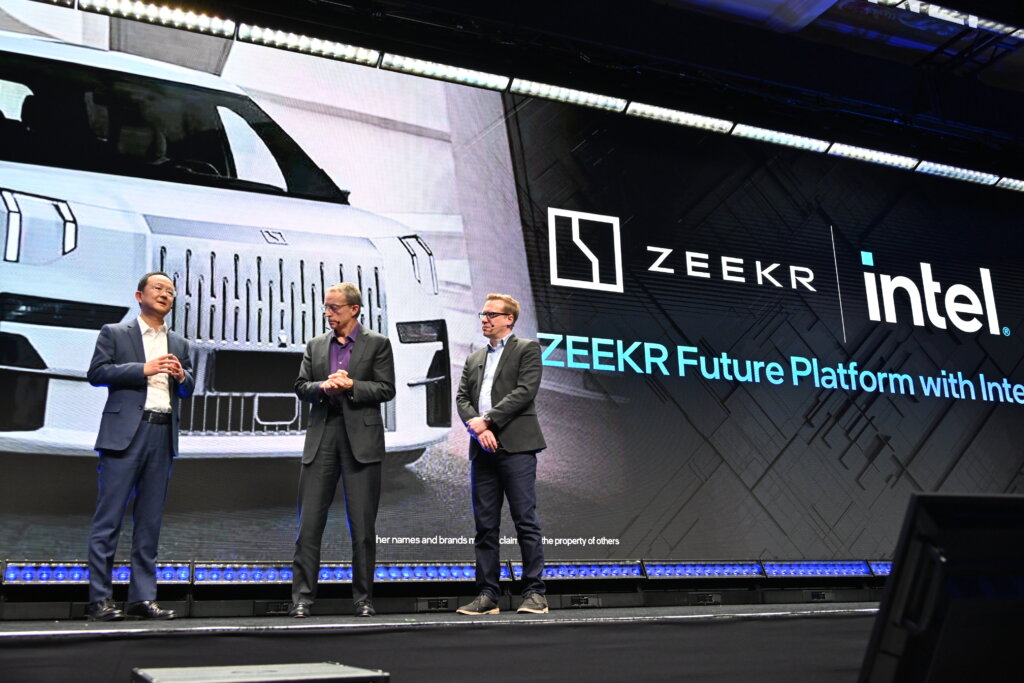
Andy An (left), president of Geely Holding Group and CEO of Zeekr Intelligent Technology, greets Intel CEO Pat Gelsinger (center) and Jack Weast, vice president and general manager of Intel Automotive, on Tuesday, Jan. 9, 2024, at CES in Las Vegas. (Credit: Intel Corporation).
Given that Nvidia has grown its influence in the EV industry, apart from the acquisition, Intel also has a new family of AI-enhanced software-defined vehicle system-on-chips (SoCs). China’s Zeekr will be the first original equipment manufacturer (OEM) to adopt the new SoC to deliver its generative AI-driven living room experiences to next-generation vehicles.
The new family of AI-enhanced SDV SoCs addresses a critical industry need for power and performance scalability. The family of SoCs features AI acceleration capabilities from Intel’s AI PC roadmap to enable the most desirable in-vehicle AI use cases, such as driver and passenger monitoring.
“Intel’s AI-enhanced SDV SoCs combine the best of AI PC and Intel data center technologies necessary to support a true software-defined vehicle architecture,” added Weast.
To ensure the strict quality and reliability requirements necessary for automotive use cases, Intel plans to work with R&D hub Imec. The R&D company will ensure Intel’s advanced chiplet packaging technologies meet the requirements set. The move underscores a commitment to be the first automotive supplier to support the integration of third-party chiplets into its automotive products.
Intel SoCs are in more than 50 million vehicles, powering infotainment, displays, digital instrument clusters and more. Intel’s expanded AI-enhanced “whole vehicle” roadmap will move the industry toward a more scalable, software-defined and sustainable future.
READ MORE
- Strategies for Democratizing GenAI
- The criticality of endpoint management in cybersecurity and operations
- Ethical AI: The renewed importance of safeguarding data and customer privacy in Generative AI applications
- How Japan balances AI-driven opportunities with cybersecurity needs
- Deploying SASE: Benchmarking your approach

